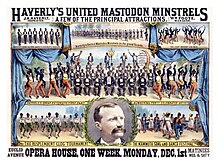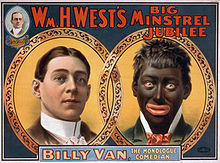Racist music

Racist music is music that expresses racism. Throughout history, music has been used as a propaganda tool to promote a variety of political ideologies and ideas, including racism.[1]
Since the worldwide civil rights movements of the 1960s, the commercial production of racist music has largely ended. Today, the production and distribution of racist music is illegal or it is strictly regulated in many countries and jurisdictions.[2] However, various hate groups continue to compose music expressing racist themes and imagery on a smaller scale.[3]
Notable examples
[edit]Minstrel shows
[edit]
The minstrel show (also known as minstrelsy) was a predominantly American form of racist entertainment that persisted from the 1820s until the 1970s.[4] Minstrel shows featured typically white actors performing songs, dances, and comedy skits based on heavily stereotyped and false beliefs surrounding African Americans[5] in blackface, a form of stage makeup designed to mock the appearance of a Black person. During the mid-19th century, minstrel shows formed the center of the American entertainment industry and served as the first uniquely American style of stage performance.[6] Minstrel shows played a significant role in perpetuating anti-Black racism and a heavily romanticized and inaccurate view of the Antebellum South throughout their existence.[7][8]
Coon songs
[edit]
Coon songs were a musical genre of songs based on heavily stereotyped portrayals of Black people. Coon songs resembled and were often synonymous with the music performed at minstrel shows. Because of this, the term coon song is typically used to refer to racist songs commercially released separately from minstrel shows performed in front of a live audience.[9]
White power music
[edit]White power music is music that promotes white nationalism, a political ideology which promotes the establishment of a white ethnostate, a society where white people dominate and rule over all other people.[10] Unlike minstrelsy, coon songs, and earlier forms of racist music, white power music typically refers to music produced during or after the American civil rights movement by various hate groups.[11] According to the Anti-Defamation League, "at any given time, there are usually between 100 and 150 white power music bands operating in the United States."[12]
Legality
[edit]In the United States, racist music is protected freedom of speech in the United States by the First Amendment to the U.S. Constitution.[13] However, laws surrounding racist music vary widely by jurisdiction and are typically classified under laws surrounding hate speech.
See also
[edit]- "Das Judenthum in der Musik" ("Jewishness in Music"), an essay by German composer Richard Wagner
- Far-right subcultures, the symbolism, ideology and traits of extreme right-wing groups
- National Socialist black metal, black metal that promotes Nazism
- Nazi punk, a punk who supports Nazism
- Rock Against Communism, a music genre derived from 1970s UK white power rock concerts
References
[edit]- ^ Street, John (2003). "'Fight the Power': The Politics of Music and the Music of Politics*". Government and Opposition. 38 (1): 113–130. doi:10.1111/1477-7053.00007. ISSN 1477-7053. S2CID 145151916.
- ^ "Comparing Hate Speech Laws In The U.S. And Abroad". NPR.org. Retrieved November 13, 2022.
- ^ "Hate Music". Southern Poverty Law Center. Retrieved November 13, 2022.
- ^ "Blackface! – A History of Minstrel Shows". black-face.com. Retrieved November 13, 2022.
- ^ "minstrel show definition – Google Search". www.google.com. Retrieved November 13, 2022.
- ^ "Minstrel: Overview". Ballad of America. Retrieved November 13, 2022.
- ^ "Definition of MINSTREL SHOW". www.merriam-webster.com. Retrieved November 20, 2022.
- ^ Lemons, J. Stanley (1977). "Black Stereotypes as Reflected in Popular Culture, 1880–1920". American Quarterly. 29 (1): 102–116. doi:10.2307/2712263. ISSN 0003-0678. JSTOR 2712263.
- ^ "What Were Coon Songs? – 2005 – Question of the Month – Jim Crow Museum". www.ferris.edu. Retrieved November 14, 2022.
- ^ Sterling, Joe (November 16, 2016). "White nationalism, a term once on the fringes, now front and center | CNN Politics". CNN. Retrieved November 20, 2022.
- ^ Messner, Beth A., Art Jipson, Paul J. Becker and Bryan Byers (October 2007). "The Hardest Hate: A Sociological Analysis of Country Hate Music" (PDF). Popular Music and Society. 30 (4): 513–531. doi:10.1080/03007760701546380. S2CID 143477219.
{{cite journal}}: CS1 maint: multiple names: authors list (link) - ^ "The Sounds of Hate: White Power Music | Reports | ADL". www.adl.org. Retrieved November 20, 2022.
- ^ Western democracies and the new extreme right challenge. Roger Eatwell, Cas Mudde. London: Routledge. 2004. ISBN 0-415-36971-1. OCLC 52251219.
{{cite book}}: CS1 maint: others (link)
